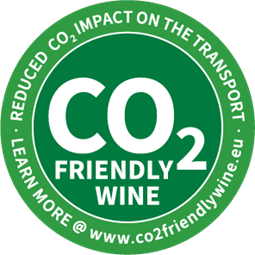
CO2 Friendly Wine
CO2 FRIENDLY = BULK
Through generations Taster Wine has supplied the Danish consumers with wine and spirits. The wine is bought from all over the world both in bottles and in an increasing amount also in bulk, i.e in liter for bottling in bottles or bag-in-boxes at our top modern and IFS Food certified bottling plant in Brøndby, not far from Copenhagen.
WHAT IS BULK?
Actually, bulk means ”without packaging and in large quantities”. That is why we call it bulk wine when we transport the wine in liter.
Bulk wine is transported either in a road tanker as we know it from e.g. milk, or in flexi bags. Commonly said, a flexi bag is an oversized bag-in-box-bag placed in an ordinary 20” shipping container. The flexi bag contains 24,000 liter of wine and when the container reaches the destination and the bag has been emptied, it is removed, and you can immediately use the container for other goods.
EFFICIENT AND CO2 FRIENDLY
As Danish and European wine lovers ”discovered” wine from overseas countries, the import of these wines increased significantly.
At the same time, bag-in-box packaging gained grounds especially in the Nordic countries so the advantage of purchasing wine in bulk for filling close to the consumer became even more obvious, as prolonged shelf life was achieved for wine filled in bag-in-box. (recommended best before date after filling in bag-in-box is 15 months on red wine and 12 months on rosé and white wine).
The first incentive for shipment in bulk was the economy, as you saved money by not transporting packaging around the world. However during the past years, the reduction of CO2 emission has also become a strong argument for importing wine in bulk. Based on 2024 figures, below calculations show that transporting wine in bulk, from the country of origin to bottling in Denmark, reduces the CO2 emission per liter by between 25-30% on the transport alone.
From the beginning, Taster Wine has been an active partner in this development and in recognizing not only the financial advantages of transporting wine in bulk but also that it ensures the quality of the wine and reduces the environmental impact, thus bulk wine forms an increasing part of our business.
HOW DO I KNOW IF MY WINE HAS BEEN TRANSPORTED / BOTTLED IN A CO2 FRIENDLY WAY?
As a private person who wants to act in an environmentally conscious way, it is often difficult to know what to do on a daily basis to reduce your CO2 footprint. In the following a few tips on how to estimate the CO2 impact of the wine.
Check the label to see the bottling place. Is the wine from an oversea country and Taster Wine is listed as bottler (either by name or VAT no. DK61092888) the wine has definitely been sent in bulk to Denmark. Of course, this is also the case when it comes to other bottlers in both Denmark and other European countries – in this relation, it is important to take into consideration the transportation to the shops as this factor is not included in the calculation.
Taster Wine wants to make the CO2 reduction of bulk wine even more visible, i.e. the advantage of buying wine that has been transported in bulk and bottled in Denmark instead of a wine bottled in the country of origin, e.g. Australia or Chile. Therefore, we have introduced a sticker with the purpose of making it easy for the consumers to decode if the wine has been transported using the most CO2 friendly method.
Therefore, we put on the sticker ”CO2 FRIENDLY WINE” on several of the wines we bottle or it is mentioned in the wine description.
In addition to the CO2 reduction related to the transportation, from January 1st 2020, Taster Wine decided that all electricity used in our bottling plant must derive from certified ”green” electricity from sustainable energy sources - see certificates here.

DANISH JOBS
Besides the financial and environmental advantages, there is another significant advantage of bulk wine. When we import bulk wine and bottle the wine in Denmark, we also create jobs in Denmark.
THE FIGURES
(Updated March 22, 2024)
Below, we present the standardized calculations that form the base of the sticker ”CO2 FRIENDLY Wine”.
The calculation is based on shipments of wine bottled in standard Bordeaux bottles (75cl.) and the transport of the bottled wine is done packed on pallets in a 40’ container = 18.000 bottles = 13.500L of wine.
For wine shipped as bulk an adjustment has been made for the increased weight of a 20” container with a flexi bag containing 24.000L of wine.
Production, use and disposal of flexi bags for transporting wine in bulk is included in the calculation of the CO2 impact of bulk. Based on a precautionary principle, the impact of a ”Single Layer BB240 Flexitank” is included (even though we primarily make use of the ”Multilayer MB240 Flexitank” which has approx. 25% lower total CO2 emission).
The calculation does not involve the impact of the bottling process why the numbers presupposes that the emission of CO2 is 1:1 whether it happens in the country of origin or at our bottling plant in Denmark (even though, we since January 1, 2020 only use certified 100% ”green” electricity).

Sources: Sea transport: EcoTransIT World | Flexi-bag: DHL
- find documentation here.
NOTES:
Previous calculations showed a different relative difference which may be indicated on the product depending on when it has been bottled. The difference between the new and the old values is ascribed to an updated methodology at EcoTransIT World and updated values from DHL from where the figures for these calculations derive.
In connection with our purchases of new bottles from our two main suppliers with production in our neighboring countries, Sweden and Germany, we have been informed that below percentages of collected/recycled glass, are used in their production of new bottles:
Green/Olive glass: 80 - 98%
White/Flint glass: 45 - 92%
For further information on Taster Wines’ environmental and societal actions, kindly see our annual CSR reports.
The calculation of the proportional reduction of CO2 has been validated and evaluated accurate by the revision of BDO (see declaration under documentation) However, we cannot guarantee the accuracy or absolute correctness as the calculations are based on figures from informed sources and suppliers. Any responsibility for the factors used and the correctness of the calculation methods of the sources is foreclosed.




